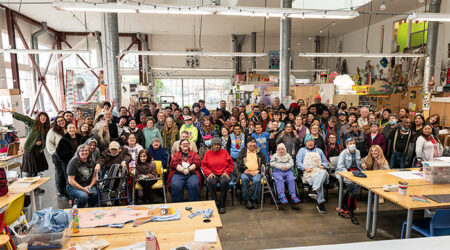Virtual Reality: The Debate Over Online Degrees
The California State University system is going to offer online degrees, fueling debate over the benefits and detriments of virtual discussion, classrooms, and instruction. Naysayers oppose virtual educations that earn a very real paper diploma citing a lack of academic rigor, easy ability to cheat, and glut of graduates that ultimately devalue the degree. […]
 The California State University system is going to offer online degrees, fueling debate over the benefits and detriments of virtual discussion, classrooms, and instruction. Naysayers oppose virtual educations that earn a very real paper diploma citing a lack of academic rigor, easy ability to cheat, and glut of graduates that ultimately devalue the degree. Proponents argue that course offerings in a virtual environment would allow instructors and students to participate globally, with lower overhead and higher graduation rates. With the University of California system set to begin online courses this upcoming spring, is the CSU system hopping on the bandwagon or are they simply doing what is necessary to survive in a state whose constitution requires higher education access to all?
The California State University system is going to offer online degrees, fueling debate over the benefits and detriments of virtual discussion, classrooms, and instruction. Naysayers oppose virtual educations that earn a very real paper diploma citing a lack of academic rigor, easy ability to cheat, and glut of graduates that ultimately devalue the degree. Proponents argue that course offerings in a virtual environment would allow instructors and students to participate globally, with lower overhead and higher graduation rates. With the University of California system set to begin online courses this upcoming spring, is the CSU system hopping on the bandwagon or are they simply doing what is necessary to survive in a state whose constitution requires higher education access to all?
I took an online course (Introduction to Film) at a community college and was consoled by the instructor who, on the first and only live meeting of the class, told us that we were to be given far more work than the regular class. I was sincerely hoping for the opposite. However, I learned more from that single online class than from a live sociology class whose instructor was horrible for reasons better left unsaid. After transferring to Berkeley, I found that the workload of my online class prepared me for the intensity of coursework in upper division, proving to me that the instructor is still just as responsible for the quality of the class, online or otherwise.
So, what’s it like to take an online class? Online courses may or may not have a live first meeting and final exam. When meeting on the first day, students get to put a face and voice to their instructor and classmates. You learn how to navigate around the website that will be the virtual classroom for the quarter or semester. You may even get an intro lesson and syllabus and review the course requirements. Yet all of this can be easily accomplished online with video conferencing tools.
When we met as a class on a Saturday, our instructor dove into the first lesson. We watched the first (and epic) uncut shot of Orson Welles’ Touch of Evil and participated in an open discussion of the scene, taking note of the “text” of the film’s first shot and discussing what each student “saw.” We were given our syllabus, course expectations, first assignments, and dismissal.
I hoped that the online class’ workload would enable me to take five classes easily. Instead, the class would be the most comprehensive course I had taken outside of mathematics with a workload that easily required ten hours a week of dedication. We were required to read a chapter in our textbooks each week, screen a two-hour feature film that displayed the relevant techniques of the chapter we reviewed, and then “discuss” the film’s use of the technique online. The usual band of overachieving ner—um, students would chime in first with their comments followed by responses by other students and the instructor. The forum discussions were no different than ones in class where the same students would vie to be the first showoff…er—overachieving suck-ups. The assignments were much like one would expect from upper-division where there were no quizzes, and no short-answer tests. Instead, we were required to write two essays in which we screen our own favorite films and discuss the techniques of filmmaking. The final class was on a Saturday, on campus, where we turned in our final paper and sat for a two-hour final exam.
The class cost me the same amount in time, effort, and materials as any other class would. The difference was that I could participate in class while on a snowboarding trip to Tahoe and the school saved money on the cost of facilities. I did not suffer from any lack of personal interaction because there was nothing lacking. In fact, I can still tell you what a fade-cut, blocking, and high angle full shot are four years and an English degree later.
Accessibility to education would yield more degrees, lowering demand, and therefore lower the value of a Bachelor’s. But people who have an education do tend to live a little longer, have less children, and pay a higher share in taxes than those who make minimum wage with a high school degree. So I guess an online education is not 100% worthless, no?
Online classes should only be offered as general education, graduation required, and lower-division access to overcrowded classes. They would enable students and instructors who work, raise children, and commute to school the flexibility of working from home instead. The coursework should require essays to prevent cheating rather than multiple-choice or short answer questions because it’s pretty hard to sound intelligent in an essay without reading the assignments.
Why you want it: Now you can sleep in until noon after a night of poker and still get to class on-time! Excellent!
Why your mom wants you to do it: She thinks that with a diploma in your hand that you might actually find a job – and hopefully one that pays enough that you can play poker someplace other than her apartment.
Why your girlfriend doesn’t want you to do it: It gives you the reason to lock yourself in the room for hours on end with the excuse that you are “doing your homework online.” Mm-hm—homework.
By Edward Burns
Edward Burns has worked in wireless retail sales for nine years, including seven years in management. He left wireless to get his English degree at U.C. Berkeley, but still loves to keep up with the happenings of wireless equipment. He is a gadget freak, builds his own computers, and is an early adopter of new technologies.





